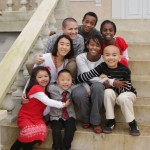If you’ve ever been in a car accident or other traumatic event, you know that for a while your blood pressure goes up every time you experience something that triggers those memories. These reactions (and even memories) are largely subconscious. How your body responds is a survival technique.
For better or worse, our brains are wired to survive. Without much thought from us, they will produce automatic behaviors that are protective.
Kids who have not had a secure, safe place (emotionally or physically) in which to grow and learn, develop behaviors that are for one thing…survival.
The part of the brain that dictates survival is different than the part of the brain that thinks logically and rationally.
Are you connecting the dots?
This means that kids from hard places have little to no experience using the part of their brain that thinks rationally. They are too busy trying to survive.
What does this look like?
In our house, it means every “No, you may not” and “Please wait a minute” is translated by our children as a threat to their survival. Those negative responses from people prove to them that people are not to be trusted at any cost. If they sense someone getting too close, they will behave in such a way to sabotage the relationship. They can’t rationalize that an activity may not be safe or emphathize that others may have a need ahead of them.
It means every raised voice (whether in play or anger) causes high anxiety and fear that their very life may be in jeopardy. In the unlikely case their rational brain was engaged, they immediately switch to the part that will guarantee survival. Some kids flee, some freeze, some fight. None think. In these moments, their behavior is as instinctual as blinking. They have no control over it.
Logic-based, high-reasoning consequences? Completely out of the question. Any consequence is viewed as an attack. It is never connected to their behavior.
In some incidences, they truly do not remember the behavior (even if it happened just moments ago) since it happened in such a high state of stress. It’s kind of how our brain blocks out pain. I know I don’t remember much about my experiences going through unmedicated labor and delivery.
As we’ve traveled through weeks of sinking or swimming (mostly sinking) through behavior, we’ve been clinging to Dr. Purvis’ observation that “angry kids are sad and kids that look crazy are scared.” Putting into perspective what our kids have internalized and how it’s leaking out in behavior and examining how our reactions can either diffuse or escalate their behavior is keeping our heads barely above water. We sink often. We’re mentally and emotionally exhausted.
That reminds me; please excuse the unedited, haphazard rambling posts such as this one.
I know it may sound like we’re making excuses for our kids. We’re not. We’d be the first ones on the bandwagon if we knew traditional parenting techniques worked on kids from hard places. We actually keep trying to jump on that bandwagon only to find ourselves banging our proverbial heads against a wall as our situation deteriorates in front of our very eyes. I won’t lie. I want a much quicker fix for their behavior. You know the kind that includes lost privileges, timeouts, and extra chores. This whole heal the root cause, instead of slapping a band aid on a gaping wound thing, is not for the faint of heart.
If you’re in our shoes (or similar ones), don’t ever let anyone tell you that trust-based parenting is the easy way out or lets the kids off the hook.
If you’re on the outside looking in, don’t judge us based on our children’s behavior or how we handle it. I’d ask you to try to see the world through their eyes, but I wouldn’t wish that on my worst enemy.
________________________________

Melissa, who was adopted from Korea as an infant, have two biological children, a son adopted at age 2 1/2 from Korea, and 3 big kids from Ethiopia (adopted at 12 to 14 years of age). She residse in Maryland where they started a ministry called The Grafted. The Grafted exists to help the local Body of Christ connect to information, resources, and organizations in order to develop a compassionate culture that cares for orphans, vulnerable children, and widows. Melissa also has a photography business that specializes in adoption homecoming and foster family photography. You can get to know Melissa better on her personal blog.

Thank you. This is perfect!
Melissa, thanks for this. It is exactly true with some of our children too. And so helpful to remember that compassion is the doorway that leads us all forward!
Melissa, thank you for sharing this. I’ve been on this journey nearly six years. I have four grown biological sons who are my pride and joy and are men who make their mama so proud. I also have two kids, home that six years, who are teenagers from a very hurt background. I have had to learn parenting techniques for them that I never would have tried with the older boys. But then, they do and say things and react in ways their older brothers would never DREAM. And those behaviors often show up and the most inconvenient and embarrassing of time — like right before one of their older brothers is about to preach his first sermon. Most people, thankfully for them, do not understand . . . but it can be SO hard for us. We are always feeling like we have to educate people who would rather not be educated, but think they know better how we should be doing this job — dancing this dance. You post is full of grace and love. Again, thank you.
Thanks for sharing.